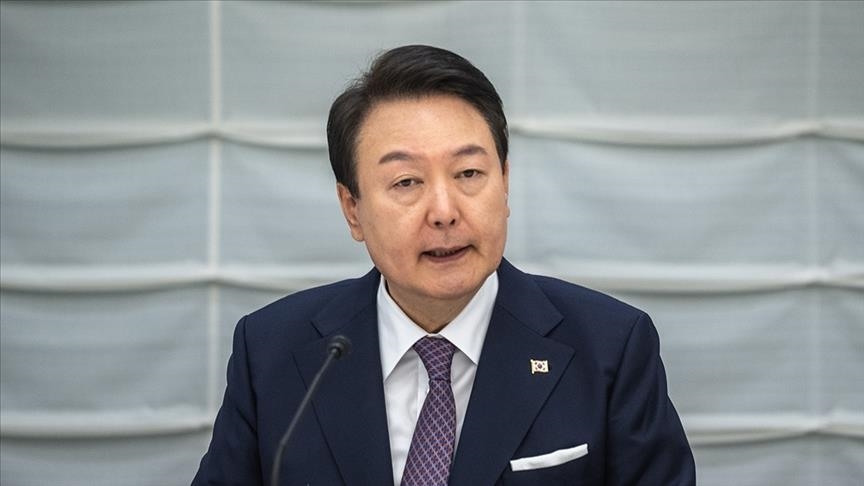FACTBOX - Events that precede arrest of South Korea's impeached President Yoon
Yoon is 1st sitting president to be formally arrested over insurrection charge in nation's modern history

ANKARA
South Korea's impeached President Yoon Suk Yeol became the country's first sitting president to be formally arrested after a Seoul court issued a warrant Sunday to detain him for an extended period over his botched martial law bid last month.
The Seoul Western District Court approved an arrest warrant, citing sufficient proof for the charges and the risk of evidence tampering.
The issuance of the warrant means that the investigators can keep Yoon in custody for up to 20 days, including the days he has already spent at a detention center following his apprehension at his residence in Seoul on Wednesday.
Separately, the country's Constitutional Court is deliberating whether to reinstate or oust Yoon from office.
Events that preceded arrest of impeached president
March 9, 2022: Yoon narrowly wins the 2022 presidential election to become the 13th president of South Korea.
Dec. 3, 2024: Yoon throws the nation into its worst political crisis by declaring martial law, saying that the opposition-controlled National Assembly has become a “den of criminals” and "anti-state forces” responsible for “wreaking havoc" on the nation.
Rejecting Yoon's martial law declaration, the main opposition Democratic Party (DP) calls for an emergency meeting of the parliament -- the National Assembly.
Yoon sends troops to the National Assembly in an apparent bid to prevent lawmakers from gathering to vote on the martial law declaration.
Dec. 4: Martial law survives only for six hours as a two-thirds majority of lawmakers, including 18 from Yoon’s own People Power Party (PPP), voted against the declaration.
Troops and police begin to retreat from the parliament shortly later.
Martial law is formally lifted following a Cabinet meeting.
Dec. 5: Yoon replaces his close associate, and Defense Minister Kim Yong Hyun, who is believed to be the person to recommend the president declare martial law.
Dec. 6: Han Dong-hun, the leader of Yoon’s PPP, announces support for suspending the president's constitutional powers, fearing another martial law attempt.
Dec. 7: Yoon survives an impeachment motion after the ruling party lawmakers boycotted, denying the vote that required a two-thirds majority.
Dec. 8: Former Defense Minister Kim is taken into custody by prosecutors over his alleged role in planning and executing Yoon’s martial law enforcement.
Dec. 10: Commander of the Army Special Warfare Command, Kwak Jong-keun, whose troops were sent to parliament, tells lawmakers that Yoon directly called him and asked for the troops to “quickly destroy the door and drag out the lawmakers who are inside,” but he does not carry out the orders.
Dec. 11: Yoon's security team blocks police officers from entering the compound to search his office to look for evidence related to the martial law declaration.
The national and Seoul police chiefs are detained by police over their roles in enforcing Yoon’s martial law orders.
Dec. 12: Yoon gives a passionate defense of his short-lived martial law decree as an act of governance, denying rebellion charges, and vowing to fight attempts to impeach him.
The national police chief Cho Ji Ho and Justice Minister Park Sung Jae are suspended from official duties for their alleged roles in the enforcement of martial law as the National Assembly passes motions to impeach them.
Dec. 14: The opposition-led National Assembly passes the motion to impeach Yoon in a 204-85 vote, suspending his presidential powers and duties. Prime Minister Han, the country’s No. 2 official, takes over presidential powers.
Dec. 27: The National Assembly votes to impeach acting President Han Duck-soo over his alleged unwillingness to fill vacancies on the bench of the Constitutional Court.
Dec. 31: A Seoul court issues a warrant to detain Yoon for questioning over possible insurrection, a charge that could see him jailed for life or executed if proven guilty.
Jan. 3, 2025 : Scuffles break out when investigators were blocked from entering Yoon’s compound by presidential security forces, and military personnel.
Jan. 7: Park Jong-joon, the chief of the presidential security service, resigns.
Jan. 14: The Constitutional Court holds its first formal hearing on whether to reinstate or remove Yoon from office. The session lasts less than five minutes as Yoon refuses to attend.
Jan. 15: Investigators and police raid the presidential compound and arrest Yoon, the first sitting president to be apprehended.
Jan. 19: The Seoul Western District Court grants investigators' request for a formal arrest warrant for Yoon, citing him as a threat that could destroy evidence. Thousands of Yoon's supporters gather outside the court in a display of solidarity. Many break into the court, smashing windows and equipment. Dozens of them are detained.
Yoon again refuses to attend the investigation.
Yoon's fate now lies with the Constitutional Court, which must decide whether to reinstate or remove him from office within 180 days after the impeachment.
* Writing by Aamir Latif.
Anadolu Agency website contains only a portion of the news stories offered to subscribers in the AA News Broadcasting System (HAS), and in summarized form. Please contact us for subscription options.







